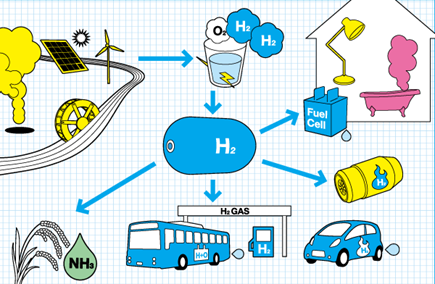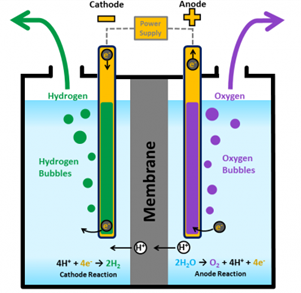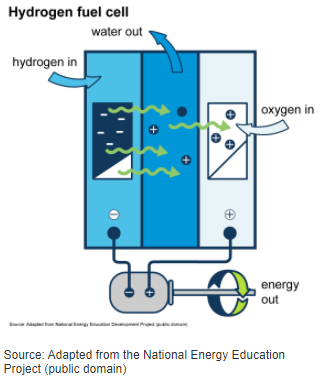 Hydrogen is an energy carrier that can be used to store, move, and deliver energy produced from other sources. Hydrogen is the lightest and most abundant element in the world. This is one of the many reasons why renewable hydrogen, also known as “green hydrogen,” is so promising as we head towards a future with more emissions-free energy. Most of the hydrogen produced within the energy sector today (about 95%)[1] is produced using fossil fuels, this is known as “grey hydrogen.” When hydrogen is produced using renewable resources the hydrogen may also be deemed renewable and designated as “green.” Another form of hydrogen, blue hydrogen, is also considered clean as the carbon associated with its production is captured and stored[2]. Renewable hydrogen’s potential does not only lie within the power sector; it may also have the potential to aid in the decarbonization of other sectors such as transportation, aviation, and shipping.
Hydrogen is an energy carrier that can be used to store, move, and deliver energy produced from other sources. Hydrogen is the lightest and most abundant element in the world. This is one of the many reasons why renewable hydrogen, also known as “green hydrogen,” is so promising as we head towards a future with more emissions-free energy. Most of the hydrogen produced within the energy sector today (about 95%)[1] is produced using fossil fuels, this is known as “grey hydrogen.” When hydrogen is produced using renewable resources the hydrogen may also be deemed renewable and designated as “green.” Another form of hydrogen, blue hydrogen, is also considered clean as the carbon associated with its production is captured and stored[2]. Renewable hydrogen’s potential does not only lie within the power sector; it may also have the potential to aid in the decarbonization of other sectors such as transportation, aviation, and shipping.
To produce hydrogen as an energy source, either from a renewable resource such as solar or wind, or from carbon-based fuels, electricity must be used. Energy passes through water to split it into hydrogen and oxygen in a process called electrolysis. Electrolysis relies on electricity to pass through a solution of electrolytes to force a chemical reaction. When utilizing renewable resources for this process, hydrogen can help consume excess electricity supply during off-peak hours. In scenarios where supply surpasses demand for energy, hydrogen can be stored in pressurized tanks, and then used in fuel cells where it is recombined with oxygen to provide power or transportation fuels. Because the byproducts from this process are only heat and water, hydrogen can also be used for heating purposes.

A hydrogen fuel cell uses the chemical energy of hydrogen to produce electricity. Hydrogen is fed into one side of the fuel cell while air (oxygen) is fed into the other side. The hydrogen then passes through the layers of the fuel cell to create both positive and negative electrical charges when the hydrogen (H2) combines with the air (O2). Because hydrogen fuel cells only emit heat and water as a byproduct, there are relatively few harmful emissions that result from fuel cell use. Fuel cells can provide varying amounts of power from individual devices up to the utility-scale. Hydrogen fuel cells can be used to power a variety of things including providing back-up storage and fueling emissions-free hydrogen powered vehicles. For more information on the applications of hydrogen storage or hydrogen fuel cell vehicles please visit our webpages on those subjects.

- The Department of Energy’s Hydrogen and Fuel Cell Technologies Office has various resources on their website that can help individuals better understand the various applications of hydrogen and fuel cell technology (Link to Video).
- The National Renewable Energy Laboratory has a Hydrogen Production Cost Tool to help project hydrogen production costs based on geographic location. The tool is a result of their analysis on the costs of hydrogen production via wind-based water electrolysis at over forty sites across the United States.
- The Green Hydrogen Coalition (GHC) focuses on building top-down momentum for green hydrogen products that leverage multi-sector opportunities to simultaneously scale supply and demand.
- The Renewable Hydrogen Alliance (RHA) promotes using renewable electricity to produce climate-neutral hydrogen and other energy-intensive products to supplant fossil fuel consumption.
 Official Government Website
Official Government Website